How a One-Star Review Got Us Three New Clients
- David Crum, Esq.
Google reviews can either be a delightful dopamine hit of professional praise or, unfortunately, a massive headache. Many law firm owners have encountered a terrible review left by a client (or a “client,” as can occur when a relative or opposing party decides to mess with you). Sometimes that review inspires such anger and defensiveness in us that posting an equally vitriolic response feels like the only proper way to achieve vindication. While I’m no stranger to the use of a four-word expletive (or two), I’ve learned that the best approach to the arduous task of responding to negative online reviews is through a mix of professionalism, vagueness, and definitely not mentioning the client’s finances. Below I’ve prepared a summary of ethical considerations and examples of cases where an attorney faced discipline for their responses, as well as a few quick tips on how to draft an answer that would make your mama proud.
1. Ethical Considerations And Real-Life Examples
The ABA’s Model Rules of Professional Conduct is the authoritative guide on how lawyers are intended to behave. Although ethical dilemmas can be famously difficult to navigate, some rules are much more straightforward than others. In our case, the rules implicated by responding to a negative online review are blessedly straightforward. Here are the two (2) rules to keep in mind when you are deciding how to respond to a negative review.
1. Duty to Hold Yourself Out as a Better Person than Others
First and foremost, lawyers have to remember that we are supposed to be ethically superior to everyone else. While this isn’t a directly citable “Rule” in the ABA’s Model Rules of Professional Conduct, the Preamble reminds us that, “A lawyer, as a member of the legal profession, is a representative of clients, an officer of the legal system and a public citizen having special responsibility for the quality of justice.” As Model Rule 1.7(1) so succinctly states, “Loyalty and independent judgment are essential elements in the lawyer’s relationship to a client.” Furthermore, Model Rule 1.18(b) states, “Even when no client-lawyer relationship ensues, a lawyer who has learned information from a prospective client shall not use or reveal that information.” This overarching decree is not only important on its own, but also serves as the foundation for the most important rule implicated by responding to negative online reviews.
2. Duty of Confidentiality
The lawyer’s duty of confidentiality (Model Rule 1.6) is paramount to keep in mind when responding to a negative online review. It’s also the most likely to get you into trouble. Model Rule 1.6(a) states, “A lawyer shall not reveal information relating to the representation of a client unless the client gives informed consent, the disclosure is impliedly authorized in order to carry out the representation, or the disclosure is permitted by paragraph (b).” Many courts throughout the nation consider Model Rule 1.6(b) to be the “self-defense exception,” because it allows an attorney to “reveal information relating to the representation of a client” to the extent the lawyer reasonably believes necessary. For our purposes, the relevant part of Model Rule 1.6(b) is below.
A lawyer may reveal information relating to the representation of a client to the extent the lawyer reasonably believes necessary:
(5) to establish a claim or defense on behalf of the lawyer in a controversy between the lawyer and the client, to establish a defense to a criminal charge or civil claim against the lawyer based upon conduct in which the client was involved, or to respond to allegations in any proceeding concerning the lawyer’s representation of the client.
The key, of course, is to determine what exactly is reasonably necessary under the circumstances. Courts have unsurprisingly looked disfavorably on attorneys whose responses to negative online reviews include (1) the client’s financial information, (2) specifics of the representation, and (3) specific facts about the case or client ascertained during the course of representation. The final taboo articulated by the court is the use of defamatory language, such as accusations that the client has acted in a criminal or otherwise improprietous manner. Let’s take a look at a sample of cases where an attorney responded to negative online reviews and faced the consequences.
i. Colorado: In People v. Isaac, 470 P.3d 837 (2016), the Court held that the attorney’s conduct in posting public, online responses to two negative client reviews violated the Rules of Professional Conduct because he included information related to his representation of the clients and client confidences. As punishment, the attorney was suspended from the practice of law for six (6) months.
ii. Nevada: In Matter of Discipline of Draskovich, 137 Nev. 920 (2021), the Southern Disciplinary Board determined that the attorney properly used the self-defense exception in responding to an anonymous poster’s lengthy negative review, but he nevertheless violated the rules of professional conduct because he went far beyond what was “reasonably necessary” to refute the review. The Board noted that the attorney’s response “did not merely disagree with the client’s assessment of his work, but instead disclosed the client’s name, case number, specific facts about the criminal charges against the client, and numerous details related to his representation of the client.” Matter of Discipline of Draskovich, 137 Nev. 920 (2021). The Board went on to quote, in its entirety, the attorney’s response (Draskovich at 923).
Mr. [client’s last name], We realize that being charged with sexual abuse against a child is truly an upsetting and stressful predicament. However, posting a false review does not help your current state of affairs. We have attempted to reach out to you to address your concerns and you have not responded to our attempts. In your case, The State of Nevada vs. [client’s full name] Case #: [client’s criminal case number], I made a number of appearances on your behalf concerning your bail and the conditions of your release on [x date, y date, and z date]. While I was able to modify the conditions imposed upon you. Judge [judge’s last name] lamented that she had imposed an insufficient bail amount considering the 12 life sentences you are facing. I met personally with you and your ‘wife’ on [a date, b date, c date, d date, and e date] to discuss how to appropriately defend you against these charges. Prior to retaining my firm, you admitted to police that you had kissed your 9-year-old neighbor on the lips with an open mouth and that this 9-year-old girl was sexually ‘attracted’ to you, a 40-year-old man. Nevertheless, I was able to negotiate your case to a reduced charge of coercion and a sentence of probation. After a lengthy preliminary hearing, you rejected the State’s offer of a probationary sentence, which is your right. Our firm then quoted you a trial fee of $40,000, which is reasonable considering the circumstances of your case.
iii. Oregon: In the case In re Conduct of Conry, 368 Or. 349 (2021), the attorney was reprimanded for revealing confidential information about a former client in his response to that client’s negative online review. The attorney’s response included the former client’s full name and details about the specific crimes with which the client was charged, among other pieces of sensitive information. The Court of Appeals, sitting en banc, made the following observation: “The attorney’s ability to harm the client is amplified when an attorney can functionally publicize a client’s secrets to the entire online world at the click of a button.” Conry, 368 Or. 349, 361 (2021).
Similar to the aforementioned cases, the attorney asserted the “self-defense exception” to Oregon’s version of Model Rule 1.6 (governing confidentiality). Again similarly, the Disciplinary Board also found that the attorney’s statements went beyond what was reasonably necessary for the attorney to have properly defended himself against the negative review. As such, the attorney was suspended from the practice of law for 30 days.
In conclusion, your State Bar really doesn’t like it when you violate your duty of confidentiality when responding to negative online reviews. So what’s the best way for you to formulate an appropriately defensive response, anyway? Below I have put together a few tips for you to keep in mind when deciding what to say to those nasty, wildly inaccurate, and totally undeserved online reviews.
2. Drafting Tips To Write A Response So Eloquent That Clients Will Want To Hire You
Did I mention that this actually happened to us? Seriously, check it out:
The Review & Response
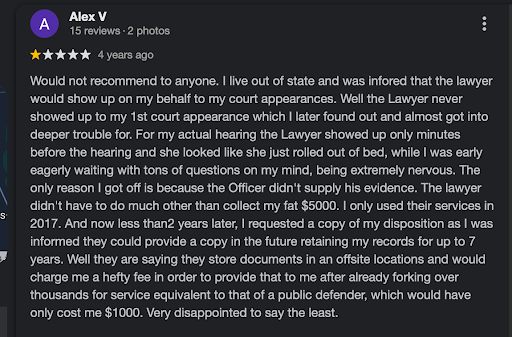
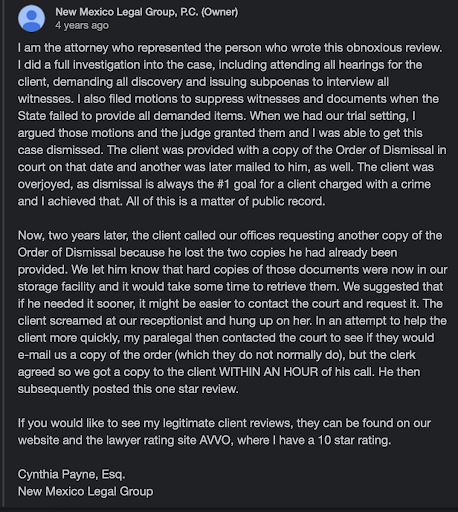
We’ve had clients tell us that they were so impressed with our attorney’s professional response that it clinched their decision to hire us. Ironically, this review provided our attorney the opportunity to show the lengths she is willing to go to for her clients. Thanks, Alex! While not every negative review will present the same opportunity, you will have a chance to demonstrate that “special responsibility for the quality of justice” of which the ABA so eloquently reminds us. In that spirit, here are the top five things you should do if you want to be disciplined by your State Bar.
1. Threaten the Client
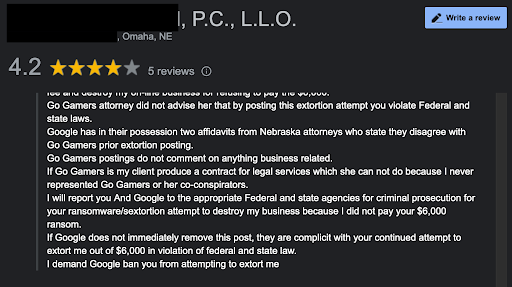
2. Humiliate the Client
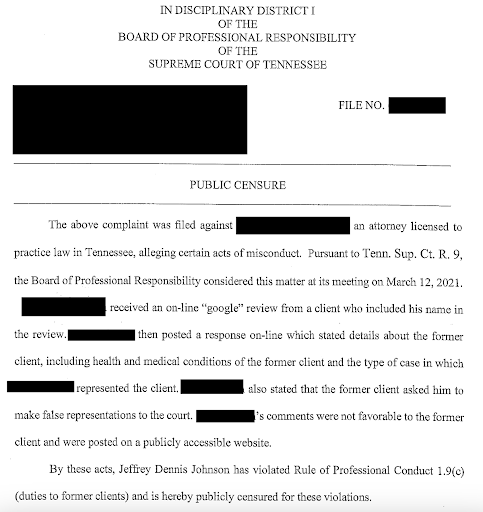
3. Accuse the Client of Impropriety
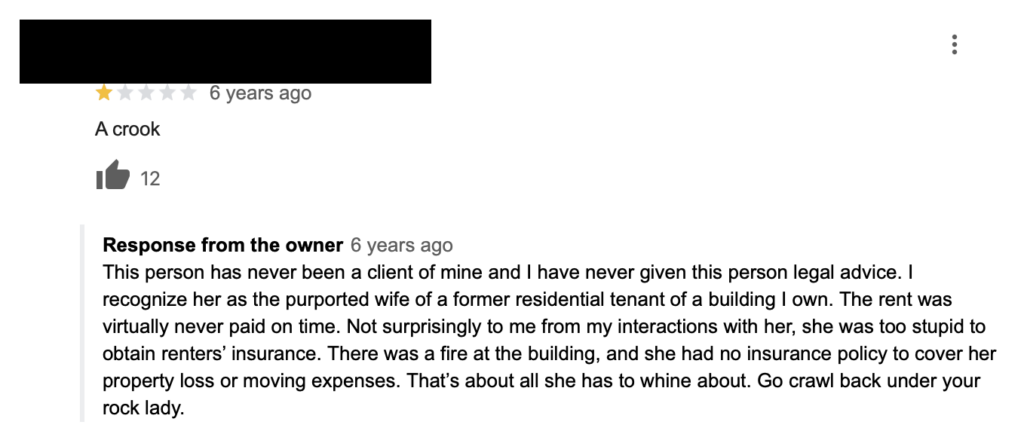
4. Discuss the Client’s Finances
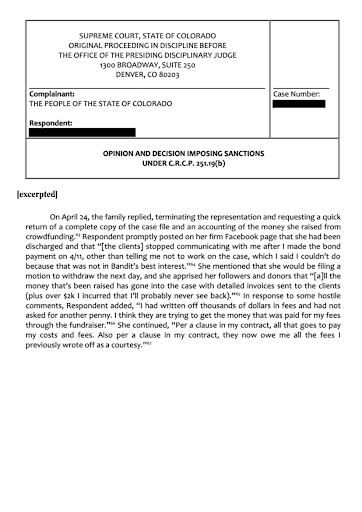
5. Challenge the Client to an Eighteenth Century-Style Duel
If all else fails, you can always take a super old-school approach and challenge your opponent to a trial by combat, like this guy.
III. How to Harness the Power of Negative and Positive Online Reviews in Your Favor
All joking aside, I wanted to finish this out by sharing a simple approach which has enabled us both to stay ahead of negative reviews and to benefit from the positive experiences our clients have had with us. First of all, and I know this is intuitive, but the best way to combat 1-star reviews is to amass as many 5-star reviews as you can. Sidenote — it also helps to have members of your team like/favorite your positive reviews, because the more likes, the greater relevance of the review itself.
But how do you acquire more 5-star reviews? Well, like I say, you don’t get ‘em if you don’t ask. So ask! We do this by getting in touch with our clients at the apex of their case, such as when we have just settled or when we have obtained a favorable outcome in court. We ask them if they will leave us a 5-star review (not just a review), and provide them with a link to the Google Business Profile reviews to make it as easy as possible. Here’s a sample email I’ve sent out to clients. Feel free to use it and tweak it however you’d like (real names have been changed).
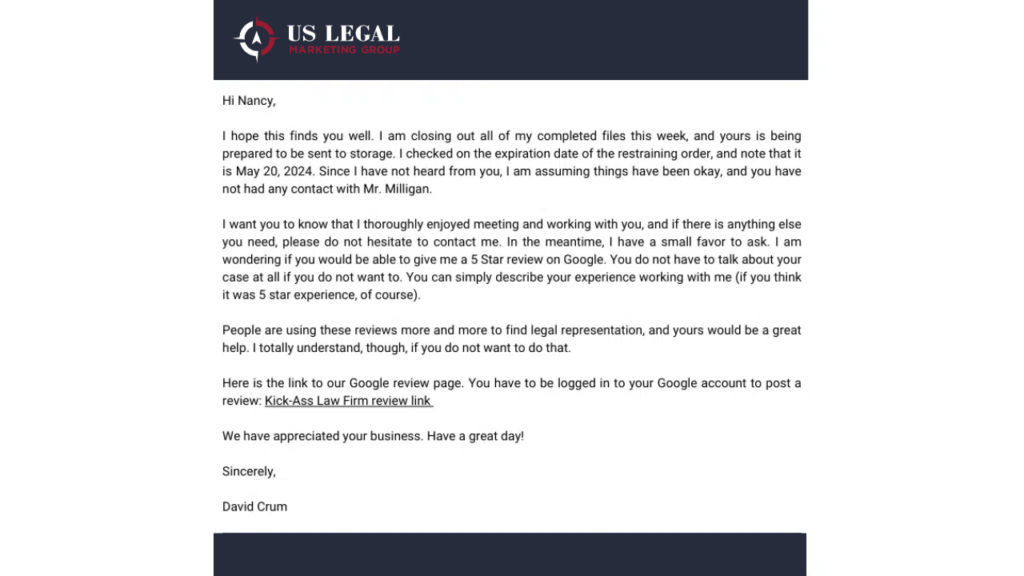
I know none of this is easy, so keep your chin up, be judicious in your review responses, and you’ll be just fine. And if you have a particular situation you would like to share with us, let us know and we will add it to our list!
Our aim at US Legal Marketing Group is to be your law firm’s one-stop destination for comprehensive marketing solutions. From boosting your online visibility through SEO and PPC to engaging your audience on social media, nurturing leads via email, and managing client relationships seamlessly through CRM, we’ve got you covered. Our content strategies position you as a thought leader while our website development ensures a seamless user experience, ultimately converting visitors into clients. I’ve worked with all sorts of marketing agencies being a law firm owner myself. Ultimately I never felt like they truly understood our goals and weren’t able to help us achieve the outcomes we were looking for, leading me to create US Legal Marketing Group, a marketing firm tailored specifically to helping law firms achieve their goals. With us, you’ll experience holistic marketing support designed to drive real results and sustainable growth for your firm.


